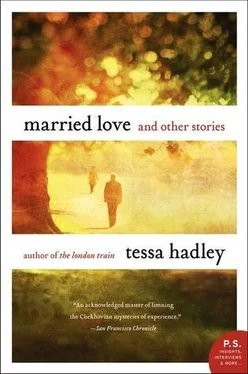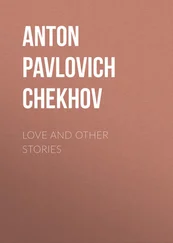A light went on in Vivien’s bedroom. The room had French windows and a little balcony, which was not wide enough to sit on but had a continental chic. From the den, they could see right into it. Opening the windows, Vivien leaned her arms on the wrought-iron balustrade, looking out into the night like a heroine in a film. She was wearing a turquoise nightdress under a filmy lacy matching knee-length peignoir: the girls knew that she called it this. With the light behind her, she didn’t look bad. Mandy put two fingers in her mouth and wolf-whistled. They expected Vivien to be shocked, to shut the windows hastily. But she only smiled, as if something were amusing, and straightened her back. Then they understood that her moments at the window had been a performance, projected at an imaginary watcher: the whistle had only made him unexpectedly real.
Turning inside, Vivien left the windows open, then came back to set up a folding chair where she had been standing. After a few more minutes she returned again, with a drink, cigarettes and lighter, and a book. She sat, crossed her legs, lit a cigarette, puffed at it in the shallow way she had, and sipped her drink; a slipper with pompoms dangled from her bare foot, which she moved in slow arcs, dipping and pointing the toes whose nails they knew were painted vermilion. Her peignoir fell open at the thigh, nothing unseemly; and, anyway, she had nice legs, for her age. Mandy whistled again, softly; Vivien settled herself more sensuously in her chair, swung her slipper. They dreaded her giving herself away any further, and yet willed her to do so. Chris couldn’t wolf-whistle, but he could do fluting whistles like bird calls. While Vivien sat reading for as long as it took her to finish her drink, his bird calls slipped intermittently — swooning, brooding messages — out of the undergrowth, through the warm night. She put down her book, leaned her head back, closed her eyes, sighed, ran her hands luxuriantly down her nightdress. The children couldn’t move or speak, in case she heard them; they swallowed with dry throats. They didn’t dare look at one another, for fear of spurting out with laughter.
Then at last she stood up and took the chair inside, shutting the window, and the spell that had bound them was broken. Susan got up stiffly, groaning with pins and needles, brushing earth and twigs from her bare knees, whispering that she had to go; she was afraid of what her parents would think if she wasn’t back soon. She assured them that she would be fine, making her way across the Downs on her own (and fortunately she was). Chris and Mandy were left alone together.
In the present too, Susan was the first to go. Chris walked out with her to her taxi when it came. They kissed clumsily — he went for two cheeks when she meant to only do one.
— We ought to meet like this again, he said.
— That would be nice.
Susan was insincere, one hand already on the door of her liberating taxi. Her counter-reaction after opening up came faster and more violently, as she aged: she longed to be alone with herself.
— Mandy’s right, Chris pursued. — The past’s important.
A chill made Susan pull her cardigan tighter; Chris seemed to feel it, too, when his eager look tipped down too far into her strained eyes. Embarrassed, indifferent to him, she burrowed away inside the taxi; its driver, elbow out of the wound-down window, summing Chris up dismissively, put the car in gear. She asked for the station.
Returning inside, Chris wondered aloud to Amanda, who crouched twiddling the knobs of a television with a bulbous green screen, what Susan had thought of him in the old days: it seemed to matter suddenly.
— Wasn’t she mad keen on you at one time? In my memory, she as good as told you so. You probably weren’t listening. Weren’t interested, anyway.
— You’re joking.
— It was serious. In so far as they’re ever serious, those kiddie crushes.
Chris took this new knowledge in, past the usual apparatus of his ideas and ironies, crowded as a junkyard.
— She did seem haunted. Disappointed. You don’t think there’d be any point in me …?
— Shouldn’t think so. That was a million years ago. It wouldn’t be you, haunting her now.
He accepted this, resigned.
But the vibration of passion had been introduced into the darkened room: they both felt it, taken by surprise. They talked about other things: Amanda queried whether books on the shelves, first editions by forgotten novelists, might be worth something. Chris said he doubted it. Meanwhile, he was uncovering more detail in the memory of what had happened between him and Mandy in the den. Not the dream-thing they had all three wanted under the beeches but a twosome more greedily down to earth, his hand pushed under her bra, hers into his unzipped jeans, actually a first for him. Though he hadn’t cared for Mandy much, his gratitude had been overwhelming; it had dissolved him. (‘Do you like me? Do you like me?’ she had kept asking.)
He woke up, for once, to the blossoming of the present moment. He couldn’t make love to Amanda now, in this decomposing house. Could he? They were too old to do it in the garden. Perhaps it didn’t matter that she wasn’t his type. Anyway, what type was he?
— Aren’t you glad I arranged for us to meet? Amanda said, still wanting praise, making her old face of pouting, flirting dissatisfaction.
Susan in her taxi, dusty hatbox on the seat beside her, fingered the ivory masks in her handbag, out of sight: a man and a woman with broad, composed, stylised faces, lowered eyes. She didn’t remember them from her childhood. They were meant not for wearing but to hang on a wall, beautiful, carved into the curve of the tusk. She was sure they weren’t trash made for tourists. Her smoothing thumb took pleasure in the long cheeks, bulging eyelids, jutting mouths, the ridges of the brows and hair, the woman’s earrings and her comb.
THE WINTER AFTER her brother killed himself, Ally got a job at a writers’ centre near her parents’ house, helping out with admin in the office. It wasn’t a satisfactory job, only part time and not well paid. She was twenty-two. She had just finished her degree in English literature and should have been building towards some sort of career; she had planned to move to Manchester where she had been at university. But everything like that had had to be put on hold, while at home her family melted down into a kind of madness. It was a relief just to leave the madness behind and drive across the moors four mornings a week to the centre several miles away. She had the use of a car, because for the moment her mum wasn’t going to work.
The moors that winter were often under a crust of snow — not enough to blanket them in white but a mean dirty frosting on the hard earth and wilted shrubs. Ally didn’t mind the bitter weather. Her guilt at getting out even for a few hours would fall away as she drove, leaving the town behind. Sometimes when she parked at the centre, crunching into the gravelled space between the kitchen and the high black garden wall, where the stones were mossy and ferns grew in the cracks, she was really all right for a moment. I’m really all right, she would think, carefully, lightly, as she pulled the key from the ignition, trying not to examine the sensation too closely or lose it with any sudden movement, as if it were a thin-filmed shiny bubble poised in her chest.
The centre was in a big bleak house built in the early nineteenth century, isolated in a dip in the middle of the moors beside a river. It had been modernised to suit its new function. A couple of outbuildings along from the kitchen had been converted into a studio for writing workshops and an office, homely with the comfortable ticking of computers and photocopier and fax machine. Fluorescent Post-it notes were stuck to the office shelves, reminding the staff of the things that needed doing, the set procedures for each group of students that came and went. Ally quickly mastered these; she was capable and sensible. The organisers of the centre, Kit and Sam, were pleased to have her helping out. Also, because Ally had always loved reading, the idea was that she would enjoy meeting the writers who taught there — there would be something in it for her, too.
Читать дальше











